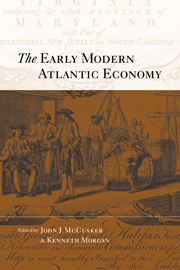Book contents
- Frontmatter
- Contents
- List of figures
- List of tables
- List of abbreviations
- List of contributors
- Dedication
- Introduction
- Part I The role of merchants and their connections
- Part II The development of trades
- Part III Imperial economies
- Part IV Colonial working societies
- 12 Emigration and the standard of living: the eighteenth-century Chesapeake
- 13 After tobacco: The slave labour pattern on a large Chesapeake grain-and-livestock plantation in the early nineteenth century
- Index
12 - Emigration and the standard of living: the eighteenth-century Chesapeake
from Part IV - Colonial working societies
Published online by Cambridge University Press: 16 October 2009
- Frontmatter
- Contents
- List of figures
- List of tables
- List of abbreviations
- List of contributors
- Dedication
- Introduction
- Part I The role of merchants and their connections
- Part II The development of trades
- Part III Imperial economies
- Part IV Colonial working societies
- 12 Emigration and the standard of living: the eighteenth-century Chesapeake
- 13 After tobacco: The slave labour pattern on a large Chesapeake grain-and-livestock plantation in the early nineteenth century
- Index
Summary
A few years ago, a summer seminar of the National Bureau of Economic Research considered American economic growth and the standard of living from the 1780s to the Civil War. The basic question, of course, was the effect of the costs and benefits of industrialization and urbanization on well-being, part of a long-term debate not only in the history of western Europe and America but in the assessment of present-day outcomes for economic and social policy worldwide. The papers discussed well-being or its absence from evidence on life expectancy, on wages and prices, on labour participation rates, on distribution of income and wealth, on availability and quality of food, housing and consumer goods, and on heights as a measure of nutrition and health. I was struck by the relevance of the issues to an entirely different transformation, that brought about by the giant migration of Europeans and Africans to the New World in the seventeenth and eighteenth centuries. It seemed useful to employ what is known so far about the standard of living in Europe and America to assess the consequences of migration for some of the participants in this great movement of preindustrial populations.
My efforts so far are part of a much larger task for future scholars.
- Type
- Chapter
- Information
- The Early Modern Atlantic Economy , pp. 319 - 343Publisher: Cambridge University PressPrint publication year: 2001



